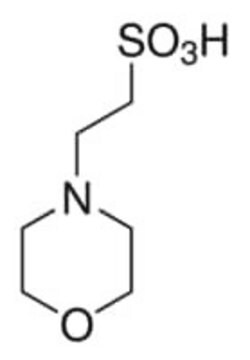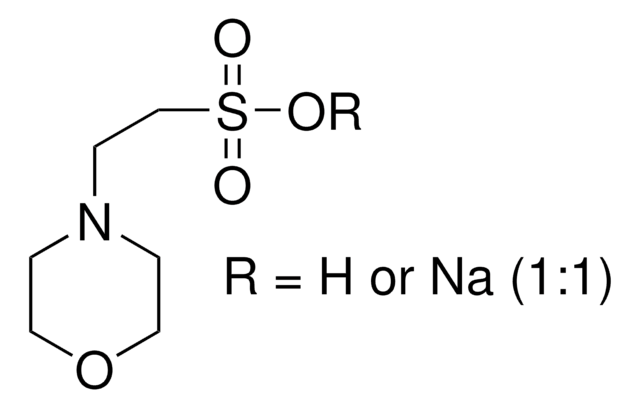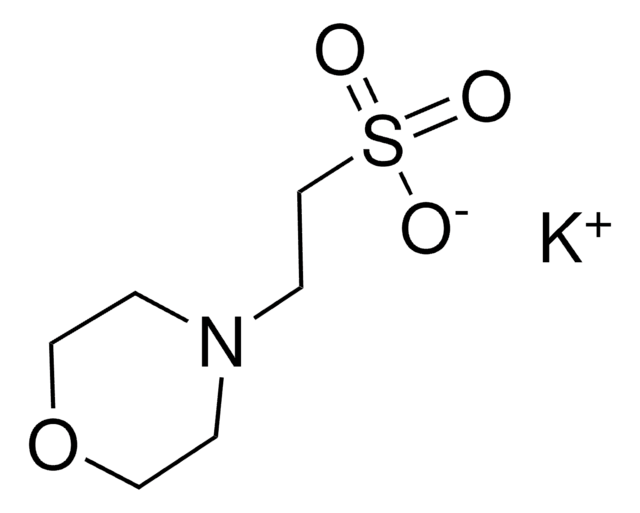M3671
MES
low moisture content, ≥99% (titration)
Sinónimos:
2-(N-Morpholino)ethanesulfonic acid, 4-Morpholineethanesulfonic acid
About This Item
Productos recomendados
Quality Level
assay
≥99% (titration)
form
powder
storage condition
dry at room temperature
impurities
≤1.0% water
color
white
pH
2.5-4 (25 °C, 97.6 g/L)
useful pH range
5.5-6.7
pKa
6.1
density
1.23 g/cm3 at 20—25 °C
1.27 g/cm3 at 20—25 °C
application(s)
clinical research
diagnostic assay manufacturing
life science and biopharma (
)
metabolomics (
)
SMILES string
OS(=O)(=O)CCN1CCOCC1
InChI
1S/C6H13NO4S/c8-12(9,10)6-3-7-1-4-11-5-2-7/h1-6H2,(H,8,9,10)
InChI key
SXGZJKUKBWWHRA-UHFFFAOYSA-N
Categorías relacionadas
General description
This versatile buffer may find widespread application in maintaining a stable environment in solutions dedicated to cell culture media, protein-based buffer formulations, and electrophoresis running buffers. Its significance extends to the purification processes of antibodies, peptides, proteins, blood components, and growth factors. MES Buffer stands out as an optimal choice for capillary electrochromatography, offering low ionic mobility. Notably, it serves as a safer alternative to potentially toxic agents like cacodylate and non-zwitterionic buffers, including citrate and malate. MES Buffer also proves valuable for fine-tuning the pH of growth media, stabilizing enzymatic solutions, and serving as a component of PAGE running buffer in diverse experimental settings.
Application
Features and Benefits
- Tested to confirm low levels of heavy metal contamination, ensuring suitability for various applications
- Effective Buffering from pH 5.5-6.7 (25 °C) with a pKa of 6.1 (25 °C)
- Highly soluble in water
- Minimal metal ion binding
- Less toxic to cells than other buffers such as Tris and phosphate
- Stable in a wide pH range
- Low UV absorptivity and Minimal reactivity
Quality
Other Notes
comparable product
Storage Class
11 - Combustible Solids
wgk_germany
WGK 3
ppe
Eyeshields, Gloves, type N95 (US)
Certificados de análisis (COA)
Busque Certificados de análisis (COA) introduciendo el número de lote del producto. Los números de lote se encuentran en la etiqueta del producto después de las palabras «Lot» o «Batch»
¿Ya tiene este producto?
Encuentre la documentación para los productos que ha comprado recientemente en la Biblioteca de documentos.
Los clientes también vieron
Protocolos
Overview of polyacrylamide gel chemistry and detailed instructions for hand-casting polyacrylamide gels using TurboMix® Bis-Tris Gel Casting Kits
Technical article page on -US EPA Method 8015 (modified): GC Analysis of Gasoline Range Organics (GRO) on Equity®-1 after Purge & Trap using "M" Trap
Nuestro equipo de científicos tiene experiencia en todas las áreas de investigación: Ciencias de la vida, Ciencia de los materiales, Síntesis química, Cromatografía, Analítica y muchas otras.
Póngase en contacto con el Servicio técnico








